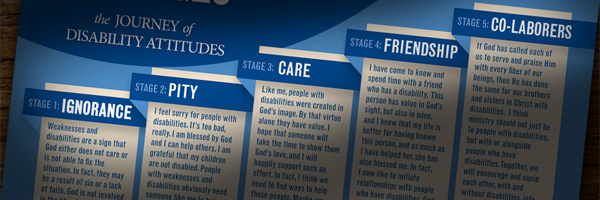Saying “Congratulations” Matters
Category : Uncategorized
The past two years have given me one experience after another to share with others The 5 Stages. It’s been an honor to be invited to speak in front of groups of all sizes to show them how important changing attitudes really is. Throughout these experiences I am certain I have learned more about disability attitudes than what I have ‘taught.’ One of the most influential experiences I have ever experienced happened earlier this year.
I had the opportunity to present the 5 Stages at a church in Hudsonville, Michigan, in January 2014 and in attendance was a friend of mine from high school. I have not kept in contact with her, outside of seeing her Facebook posts, since we graduated in 2002. Because we were friends on Facebook I was aware she and her husband had their third child just over 10 months prior to that evening and he was born with Down syndrome. She of course, like every new proud parent, posted a picture of him on Facebook with all his birth stats and explained he was born with Down syndrome. Without even giving it any real thought I just wrote the typical “Congratulations!” on her post and then wrote a little bit about how I worked at Elim and I would be more than happy to walk down this road with them as they figure out their sons unique needs. Keep in mind I must have been the 50th or 60th person to comment on this post.
Before I posted it on her wall I sat there staring at it thinking, “What if she gets mad? What if she responds, ‘Who do you think you are, not talking to me in 11 years and the first thing you say to me is this?’” I was worried about her reaction, but I posted it anyway. Flash forward to me talking to her face to face in Hudsonville about the day Owen was born; and for the first time I found out her reaction. Through tear-filled eyes she recounted the details of that day and then mentioned my comment on Facebook. She told me I was the first person to say, “Congratulations…everything was going to be ok…her son was going to be an incredible blessing in their life.”
Thinking back on this story has reminded me of a couple of things. First, every life…EVERY life, is a blessing from God. Whether a baby is born without deficiencies, or with Down syndrome, or with cerebral palsy….. each life is created in the image of God. My friend’s son was born with Down syndrome and will live with it his entire life, but God has a plan for him just like every baby born that day, or week, or month.
Secondly, I’m reminded that disability awareness is lacking in our world. We need to help others recognize that a baby born with a disability is not something to mourn. God creates each of us uniquely, with different abilities. Our abilities or inabilities do not determine our value; we have value because of who we all are – God’s children. God has placed a call on each of our lives, including the lives of those with disabilities, and we need to equip each other and all of God’s children to answer that call.
We need to change attitudes.
I hope my story helps you start by saying, “Congratulations!” to every mom and dad, including those parents who children are born with special needs.
Dan Quist is the former Church Relationship Coordinator at Elim Christian Services. He is currently serving at Timothy Christian Schools as their Director of Admissions and Student Recruitment. Quist has a degree in Secondary Education and a Master’s in Educational Administration. He resides in Palos Heights, IL with his wife and two children.

